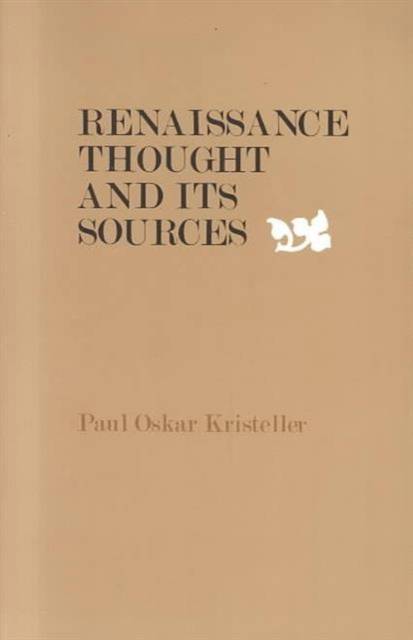
- Afhalen na 1 uur in een winkel met voorraad
- Gratis thuislevering in België vanaf € 30
- Ruim aanbod met 7 miljoen producten
- Afhalen na 1 uur in een winkel met voorraad
- Gratis thuislevering in België vanaf € 30
- Ruim aanbod met 7 miljoen producten
Zoeken
Omschrijving
Renaissance Thought and Its Sources presents the fruits of an extraordinary lifetime of scholarship: a systematic account of major themes in Renaissance philosophy, theology, science, and literature, show in their several settings. Here, in some of Paul Oskar Kristeller's most comprehensive and ambitious writings, is an exploration of the distinctive trends and concepts of the Renaissance, grounded in detailed historical investigation.All of these fourteen essays were originally delivered as lectures. Part One identifies the classical sources of Renaissance thought and exposes its essential physiognomy, indicating its humanist, Aristotelian, and Platonist traditions. The next two parts present Renaissance thought in the historical context of the Latin and Greek Middle Ages. Part Four offers a thematic study of Renaissance thought, examining its characteristic conceptions of man's dignity, destiny, and grasp of truth. Part Five forms a summary from the perspective of a central theme of Renaissance intellectual life and of the entire Western tradition: the relation of language to thought and the seemingly insoluble contest between our literary and philosophical traditions.The reader of "Renaissance Thought and its Sources" enjoys the results of meticulous study in a concise yet comprehensive format. Throughout, Kristeller achieves a graceful blending of sever historical scholarship and adherence to humane values that the editor calls "nearly a lost art in our times."
Specificaties
Betrokkenen
- Auteur(s):
- Uitgeverij:
Inhoud
- Aantal bladzijden:
- 347
- Taal:
- Engels
Eigenschappen
- Productcode (EAN):
- 9780231045131
- Verschijningsdatum:
- 15/04/1979
- Uitvoering:
- Paperback
- Formaat:
- Trade paperback (VS)
- Afmetingen:
- 150 mm x 227 mm
- Gewicht:
- 480 g

Alleen bij Standaard Boekhandel
+ 169 punten op je klantenkaart van Standaard Boekhandel
Beoordelingen
We publiceren alleen reviews die voldoen aan de voorwaarden voor reviews. Bekijk onze voorwaarden voor reviews.











